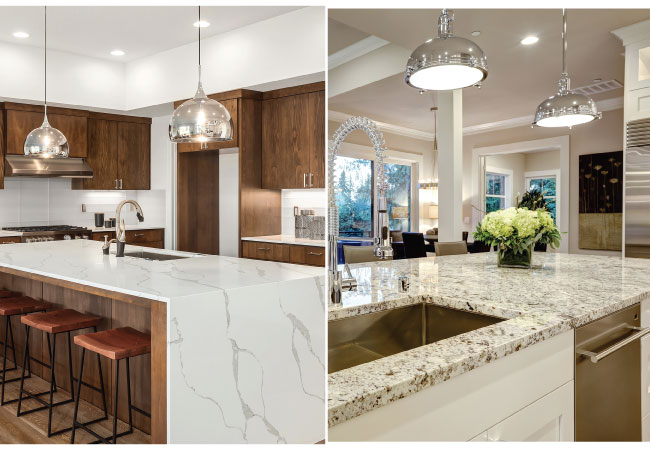The debate about quartz surfaces vs. granite is neverending. You can find many people juggling between the two.
Whether it is furnishing your new home or redecorating your office, the choice of stones is tough to make.
But if you get to know the functions and features of both, you can make an informed decision.
Many people prefer installing stone furnishings like countertops, kitchenware, bathroom, and sanitary equipment, etc. because the stone has many natural qualities. It is
- Heat resistant
- Low maintenance
- Long-lasting
- Robust
Embellishing homes and offices with stone is one of many owners’ top choices because of its essential qualities.
It is a one-time investment, and people want long term results. Even the contractors, designers, and builders also suggest using stone accessories for your home.
The practical benefits of quartz and granite, combined with the beauty of their texture, make stone an obvious choice for most interiors and exteriors. But first, we must understand the terms, solid surface vs. quartz, to determine what is better between the two.
What is Solid Stone?
Granite or solid stone is a coarse igneous rock formed after the magma cools down.
It has a high content of quartz, alkali feldspar, and silicate minerals. It is mostly used as a paving block and building stone.
It is one of the most prestigious materials used to produce elegance in building projects with varied uses. It has multiple benefits; from building countertops to monuments, it is used everywhere.
What is Quartz Surface?

Even though quartz refers to a natural mineral, engineered quartz is a human-made product. It is made with grounded particles of stone bound together with resins and pigments. Unlike natural stones, it is made with the reminiscent particles of quartz stone with a resin binder.
Both kinds of stone have inbuilt qualities and appearances.
To clear the doubt about quartz surfaces vs. granite surfaces, you can read the article further.
While working on remodeling your kitchen or renewing your bathrooms, the biggest dilemma is to choose between granite and quartz.
Both are distinct kinds of stone and have similar capabilities. But the question always arises about a better choice.
- Do you want your countertop to be more appealing?
- Will the material be challenging to maintain?
- Is the quality dependent on the price?
- Will the type I choose fit my budget?
- Can the product sustain pressure?
All such questions start popping in your head because the entire decor depends on the countertop you choose. If you read ahead, you may find an answer.
Difference Between Solid Stone and Engineered Stone
Undoubtedly, both have their enthusiasts. Some find quartz better, and some prefer granite.
But if you are new to both kinds, you must understand them fully, and when you are done with it, you can quickly decide the best between solid surface vs. quartz.
The following points will help you comprehend what suits you.
-
Appearance
Appearances are not deceptive in this case. Granite comes in a lot of hues and textures because it is formed naturally.
No rock is similar to the other. It has a naturally gorgeous appearance that enhances your space.
On the other hand, quartz looks like a stone and also offers you a customization facility. You can quickly get a personalized quartz slab, while you have to look for a granite slab matching your interior design among so many options available.
-
Price
Solid surface vs. quartz price is not much debatable. Depending on the tint and texture, the granite price ranges from Rs.70 to Rs.450 per square foot.
Meanwhile, quartz can cost up to Rs.400 to Rs.1500 per square foot installed.
The price of quartz is such because it is human-made and is heavier than solid stone. No matter what you prefer, you must check with your installer for the cost of installation too.
-
Composition
Granite is a natural stone; it comes directly from stone quarries, is cut and polished, and delivered to you after fabrication.
In comparison, engineered quartz stone may contain a varied composition of quartz and other minerals.
They are not directly extracted from the mines. Instead, they are made from various stone byproducts. After grinding them, they are bound with resin and then are delivered to you as a countertop.
-
Durability
There is a lot of confusion in mind about solid surface countertops vs. quartz countertops when it comes to durability.
Both are immensely strong, but quartz has the upper hand over granite.
Granite is a naturally porous material, requires sealing during installation and resealed regularly. Also, the natural solid stone can catch stains easily.
Both the stone materials are robust, but granite can chip more readily compared to quartz. Both have a lifespan of 25-30 years, depending upon the amount of care taken.
Another critical factor is whether you want to install it in your interior or an outdoor setting. If the countertop is exposed to scorching heat, you must ask your dealer in advance what material would be best.
-
Maintenance
Quartz contains resins inherently that makes it stain resistant.
You need not clean it with soap and water daily.
Granite, as compared to engineered stone, can sustain marks of the oils and acids you use.
You need to clean it frequently with soap and water. Moreover, they need frequent sealant too. Although if you use non-acidic cleaners and non-abrasive sponges, you can increase the longevity of your countertop.
-
Environment Friendliness
Since granite is a natural stone, the extraction produces fewer carbon emissions.
Meanwhile, quartz has approximately 7 percent of added minerals and is bound with resins.
It generated more pollution until 2008 after a study showed that the industrial measures taken had reduced the number of carbon emissions from both granite and quartz.
To conclude
The debatable topic of quartz surfaces vs. granite can come to a solution when we understand various aspects.
Both of these materials are premium and of top quality. Each has a different advantage. No material can be considered faulty. The material you choose depends on your preference and requirements.
For people who like authentic and natural products, granite is more appealing. Whereas, people who keep the durability and low maintenance a priority, quartz is the best option.
So, before investing in any material, you must research them. It will help you make an informed decision, and you can find ways to reduce costs.







